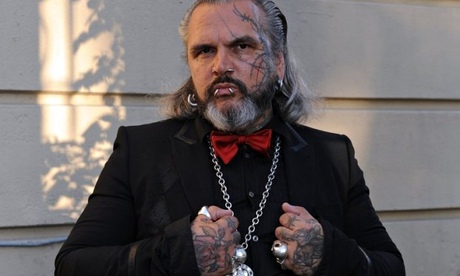
In a city gearing up to celebrate the anniversary of its open borders, it is the one place where the door often remains emphatically shut.
Berghain, the Berlin nightclub celebrating its 10th birthday this year, has become notorious not just for the dark industrial techno it serves up from Friday nights until Monday afternoon, nor the sexual fantasies lived out in the "darkrooms" inside this former power plant, but also for its strict and enigmatic door policy.
Numerous websites and forums promise to spill the secret of how to get past the grim-faced bouncer at arguably the world's most famous nightclub. Turning up in big groups is said to be a no-no, as is chatting in the queue.
Some advise wearing white T-shirts and dark jeans. Others recommend camping up, fetish gear or leather straps. "Wearing a scarf is always good. They like scarves," advises one regular.
A new "How to get into Berghain" app even promises live updates on the length of the queue outside the super-secretive venue with the motto "we decide with whom we want to party". But for its anniversary celebrations, Berghain is opening its heavy gates to reveal a surprisingly gentle side. For a start, there is no face control at the art exhibition staged in one of the industrial halls, which includes paintings, photographs and videos inspired by the venue, historic graffitied toilet doors and an aquarium filled with male urine, lit in melancholy hues.
A memoir by the club's bouncer, Sven Marquardt, launched in Germany to critical acclaim this week, reveals the heavily tattooed and pierced figure guarding Berghain as a sensitive soul who used to look for love on the streets as a gay punk in east Berlin. "Even when I was a punk, my motto was always: mothers and the elderly first," Marquardt writes in Die Nacht ist Leben (The Night is Life), ghostwritten by journalist Judka Strittmatter.
At the launch party on Thursday, the feared Berlin legend claimed that at 52 he was "fast on my way towards age-related mildness", and said he strengthened himself for his nine-hour shifts with a healthy diet of Ryvita and bananas.
Marquardt, who trained as a photographer, started his doorman career at Snax – one of Berghain's predecessors, which had the tag line "for pervy men only". He now insists on addressing revellers he turns away with the formal "Sie" rather than the informal "Du" and advises his younger colleagues to show respect as they send pundits back into the night: "It may be your thousandth guest of the night, but for them it may be the first time they are turned away."
Being a bouncer, his book argues, is all about fostering the "right mix": "I don't mind letting in the odd lawyer in a double-breasted suit with his Gucci-Prada wife. If they make a good impression, let them in.
"We also take guys in masks and kilts, or Pamela Anderson blondes in run-of-the-mill high-street outfits who tag along with bearded blokes, licking the sweat off each others' armpits. That, for me, is Berghain."
This week, broadsheets and online forums have been filled with odes to the "Berlin Philharmonic of electronic music". Many credit Berghain – whose name is a compound of bordering districts Kreuzberg and Friedrichshain – with a key role in reinventing the German capital.
"At the start of the noughties many felt that Berlin techno had run its course," said Airen, an author and popular blogger on the city's club scene. "Many clubs were closing their doors, and it was the first year without the Love Parade in the capital.
"But Berghain managed to turn clubbing into an adventure again, and thus unify the dispersed techno scene. Countless clubs have since shot up in its shadow. Without Berghain, the Berlin techno wave may have long ebbed away."
For many of the 3,000 clubbers who pass through the club's gates on a typical night it is the main reason for coming to the city. Several of the resident DJs regularly export the "Berghain sound" – dark, industrial techno, often slowed down by 6-8% – to clubs around the world.
The Berlin senate, too, has recognised the club's commercial pulling power: in 2010, it offered Berghain €1.25m (£1m) to fund a building extension. The club's owners refused – unusual in a country where many cultural institutions draw state subsidies.
"Berghain has become the ultimate symbol of the 'new' Berlin," said Tobias Rapp, author of Lost and Sound: Berlin, Techno and the Easyjetset. "When I wrote my book in 2009, only people in the techno scene knew about Berghain. Now my father-in-law is begging me to take him there."
Bouncers such as Marquardt, he argued, were crucial to protect subcultures like those flourishing at Berghain. His advice for getting through the door? "Don't be afraid. People who are afraid usually aren't very good at partying."

